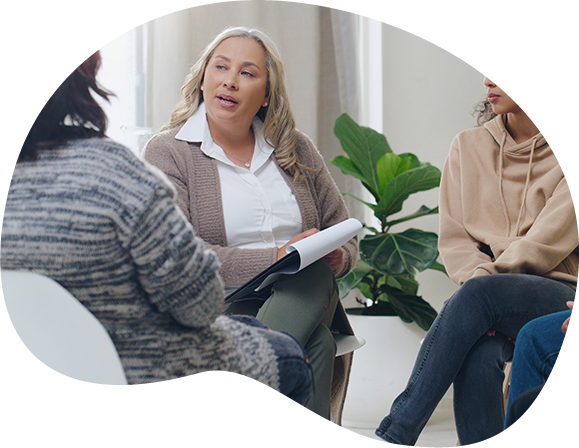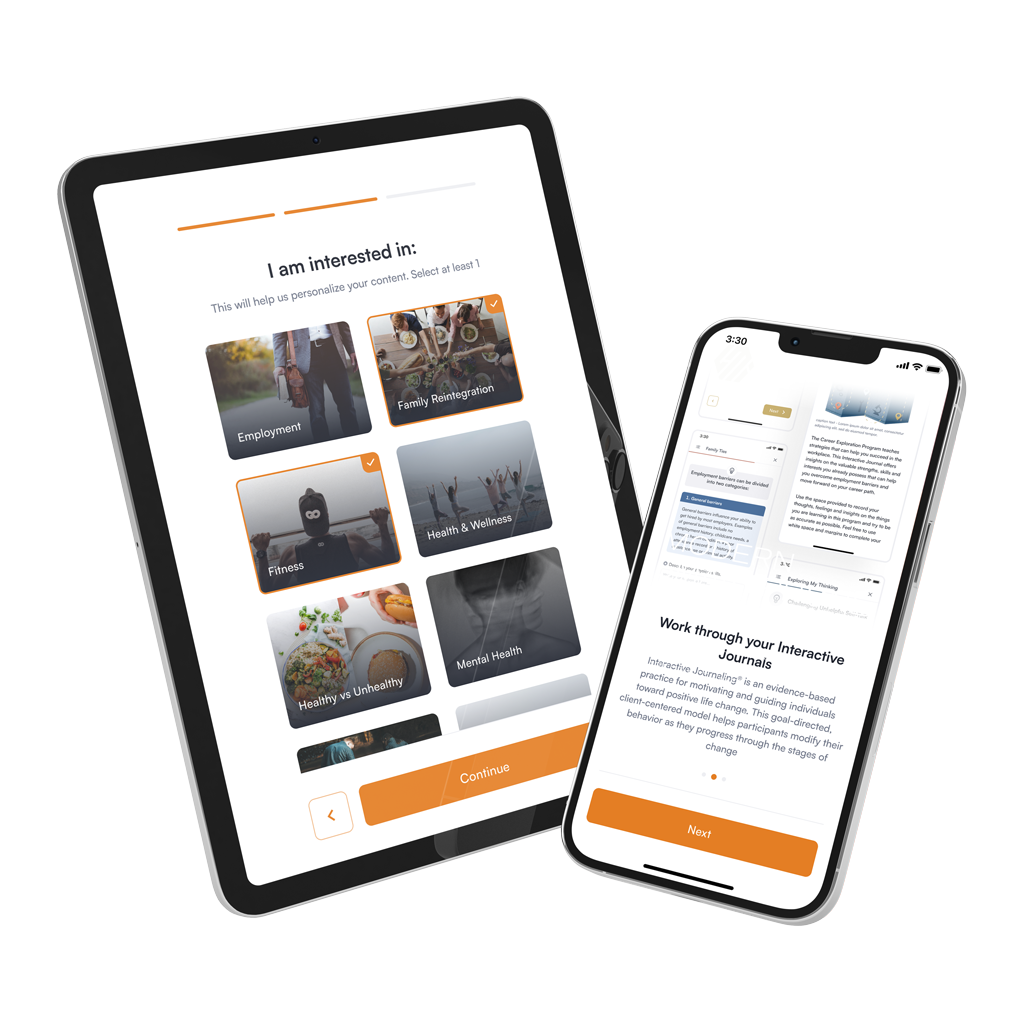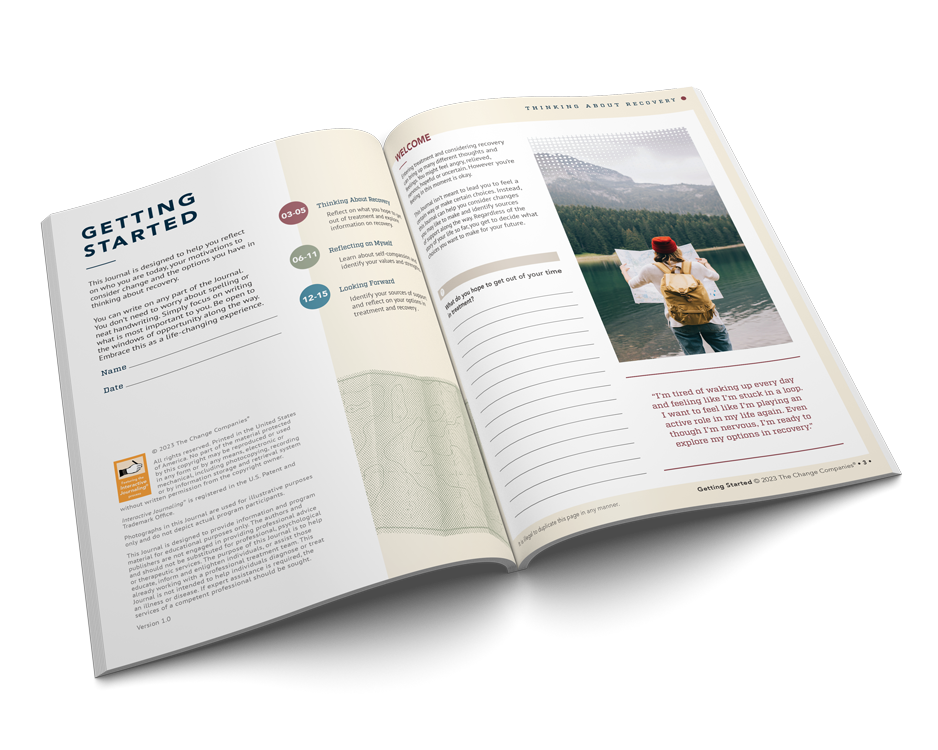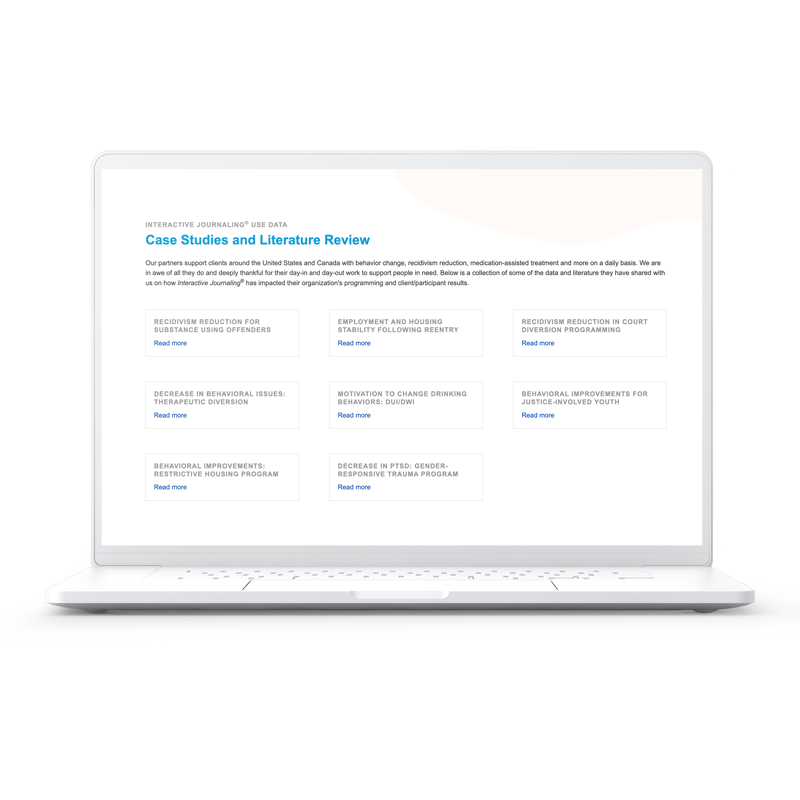
EVIDENCE-BASED SOLUTIONS
Adult Addiction Treatment
Home / Sector Solutions / Adult Addiction Treatment
At The Change Companies, we put the tools for change directly into the hands of clients and equip staff with tools for person-centered care and individualized treatment. Our core solution for adult treatment, My Life in Recovery, applies the latest research in addiction, mental health and personal change theory for participants in treatment for addiction.
Our ASAM-aligned adult treatment curricula allow you to tailor program delivery to the specific needs of your treatment clients, even when staff resources are limited. These can be used across levels of care in group therapy, individual counseling and in different cultural and special population settings. Structured treatment curricula simplify individualized treatment planning and session documentation.
In addition to evidence-based curricula, our core solution includes access to the Fidelity Platform and live training for staff to ensure your organization is implementing best practices and gaining relevant skills for effective, person-centered treatment.
QUICK NAVIGATION
This page provides an end-to-end solution for adult addiction treatment professionals that includes curriculum, training and additional clinical resources.
| Evidence-based Adult Behavioral Health Curriculum | |
| Staff Training and Skill Building | |
| Additional Clinical Resources | |
| Digital Curriculum (Atlas) |
Solution Benefits
NO. 1
Makes individualized and person-centered care possible
NO. 4
Align programming with ASAM Criteria dimensions
NO. 2
Makes using evidence-based practices easy and effective
NO. 5
Boost staff confidence, preparedness and effectiveness
NO. 3
Fidelity and consistency between sites and facilitators
NO. 6
Unlocks measurement-based care and value-based care models
We have developed our treatment plan around [Interactive Journaling®]. It makes it easy to do charting and when JCAHO and CARF come in, they just think it’s great - everything is so clearly documented.” Nan Casey, IOP Coordinator, Tennessee Christian Medical Center
“I do like very much the method of Interactive Journaling®… At each progress step along the way, clients reflect on and generate their own language about material relevant to important changes, and how it applies in their lives. Whatever the therapeutic modality - residential, outpatient or intensive day treatment - clients do the personal work needed to make important life changes." Dr. William R. Miller, PhD, Co-developer of Motivational Interviewing
“I am in treatment now and your books are really incredible. I really am finding who I am again in my new sober life with the help of your education.” Interactive Journaling® participant
“Journaling helps our clients personalize the concepts taught in classes, so the solutions can be applied to individual circumstances.” Scott Hammond, Program Manager, Lighthouse Outreach Center
“One of my clients said he realized how much impact his negative peer associations had had on his life… He started saying ‘no’ to his old friends for the first time and felt really good about it.” Dorthy Perrotte, Martin County Community Corrections, Indiana
“Interactive Journaling® is a superb tool. Putting a pencil to paper in a focused and structured manner lessens denial, heightens insight and facilitates problem solving. No one understands this concept and offers a better tool than The Change Companies.” Claudia Black, Ph.D., Addiction Specialist, Author
MY LIFE IN RECOVERY CURRICULUM
Evidence-based Adult Behavioral Health Solution
My Life in Recovery applies the latest research in addiction, mental health and personal change theory for participants in treatment for addiction. The Journals in the My Life in Recovery curriculum can help participants work toward success in treatment and a healthier, happier life. These Journals can be individualized and tailored to the unique needs of each participant.
| Getting Started |
|
|
The 12 Steps of Recovery
|
|
|
My Personal Change Plan
|
|
|
Substance Use Education
|
|
|
The Power of Self-talk
|
|
|
Managing My Emotions
|
|
|
My Mental Health
|
|
|
My Coping Skills
|
|
|
My Relationships
|
|
|
Managing My Life
|
|
|
Maintaining My Recovery
|
UPSKILL STAFF and ENSURE IMPLEMENTATION FIDELITY
Staff Training and Skill Building
Download the training options guide →
Fidelity Platform
The Change Companies’ Fidelity Platform is an integrated resource center providing a wide range of learning opportunities and resources to enhance the skills and knowledge of addiction treatment and behavioral health professionals. On-demand trainings, ASAM resources, motivational interviewing techniques, session vignettes, and facilitator skill-building videos support continuous learning and improvement that are relevant to job roles and career development.
Interactive Journaling® Training
The Change Companies’ two-day facilitator training helps juvenile justice professionals further develop their skills for implementing Interactive Journaling® facilitation skills. Live training focuses on building helpful working relationships with clients, practicing motivational skills, preparing for sessions and using evidence-based case management techniques.
ASAM Criteria Training
Application-focused ASAM Criteria training, offered by our training division Train for Change, helps treatment professionals build skills and offers strategies for implementing and sustaining the criteria in adult treatment settings.
INTERACTIVE JOURNALING®
Case Studies and Research
Across a range of studies on Interactive Journaling® in treatment settings, researchers have found:
|
92% of participants said their Journals helped their rehabilitation
|
|
|
84% of participants expressed plans to keep their Journals after program completion
|
|
|
94.7% of participants said the program would help them change their drinking behaviors
|
|
|
In prison-based addiction treatment programs, program completers were four times less likely to engage in substance use at 48 months post-release
|
CURRICULA FOR SPECIFIC NEEDS
Additional Clinical Resources
Browse curricula in our online store →
Co-occurring conditions track
The Co-occurring Conditions curriculum applies the latest research in addiction, mental health and personal change theory for participants in treatment for co-occurring conditions. The curriculum supports participants in their work toward success in treatment and a healthier, happier life.
Self-Management
The Self-Management curriculum encourages individuals to become active participants in the care and maintenance of their own psychological wellness. Participant Journals have been customized for both mental health and addiction treatment populations.
MAT/MOUD
The Medication Assisted Treatment Journal takes a whole-person approach to treatment and recovery, giving participants the opportunity to not only learn more about medication as a form of treatment, but to gain skills and insights that will help them make positive life changes, set healthy goals and live a full life in recovery.
The ASAM Criteria, 3rd Edition
The ASAM Criteria applies the newest science in the field of addiction medicine to assist patients from assessment through placement and recovery and streamline care with the latest addiction science.
ASAM Level of Care Certification Materials
The Change Companies provides a workbook and manual for ASAM Level of Care Certification preparation. These materials outline the rating elements that will be assessed by CARF certification surveyors and provide a template for programs to conduct self-assessments to identify strengths and areas for improvement.
ASAM Criteria Implementation Guide
The ASAM Criteria Implementation Guide helps programs improve quality of care in manageable increments aligned with each program’s unique goals and challenges. It uses the ASAM Principles to describe characteristics that should be common to all treatment programs and serve as parameters for flexibility, while The ASAM Criteria functions as a model for the expected specifics of care and of care delivery.
ASAM Training
The Change Companies offers a range of ASAM skill-building trainings for professionals to get an in-depth look at the theoretical foundations of The ASAM Criteria and practice skills at every stage of the treatment process: assessment, engagement, treatment planning, continuing care and transfer or discharge.
Trauma programming for women
Trauma in Life emphasizes the experiences of women and their responses to trauma. Participants enhance their knowledge of trauma, assess the impact of trauma in their lives, develop strategies to increase resilience, break the cycle of trauma and consider next steps.
Trauma programming for men
Traumatic Stress and Resilience is a Journal written specifically for men who have experienced some form of trauma. Participants work through each section, identifying personal challenges, strengths and skills to promote recovery and build resilience. Topics include identifying characteristics and common symptoms of trauma and strategies to cope with traumatic events.
Getting Back on Track is designed for those times when things haven't gone as planned. If a client is experiencing a setback, this self- directed Journal can help them get back on track and prepare to manage obstacles down the road.
Wellness and Recovery is a visually engaging cognitive-behavioral curriculum that helps individuals in recovery develop lifelong wellness habits. Participants gain skills and strategies for a healthy recovery within five dimensions of wellness – emotional, intellectual, physical, social and spiritual – and learn how to access the support of others on their recovery journey.
The Change Companies offers treatment materials for American Indians, Canadian Indigenous groups and Alaska Natives. Tribal treatment curricula were developed in close collaboration with tribal leaders and community members.
Women in Recovery provides gender-specific information on alcohol and other substances and substance use disorders. Created in collaboration with Stephanie Covington, PhD, a leading expert in women’s addiction programming, this Journal helps women explore their relationships with alcohol and other substances.
Harm Reduction
What About Marijuana? presents the facts and potential risks of marijuana use and guides participants in weighing these risks against their personal reasons for use. This curriculum is designed to help youth and adults consider their use of cannabis and what changes they may want to explore making.
Alcohol use for college students
CHOICES provides campuses with a brief, research- based, cost-effective and easy-to-implement method for helping students reevaluate their choices around alcohol. The program engages students in self-reflection and discussion about facts, risks and norms associated with alcohol while equipping them with the information, strategies and skills to make wise decisions.
Modular 12-step programming
The Change Companies' My Life in Recovery curriculum offers a 12-step Journal that helps participants explore the fundamentals of the 12 Steps, including a brief introduction to each Step, frequently asked questions, what it means to work the steps and benefits they may experience.
All-in-one 12-step resource
My Personal Journal has helped more than 1.5 million people in treatment as a helpful tool for sobriety. This Journal places special emphasis on substance use, the first three steps of a Twelve-Step Program, feelings, relapse prevention and life management.
General life skills
The Life Skills curriculum focuses on general life skills, including managing emotions, communication, developing healthy relationships and physical health. It was designed for a range of populations working on behavior change.
Job readiness
The Career Exploration curriculum allows participants to explore how their current strengths, skills and interests align with a career path. Participants develop a plan for pursuing their identified career path and learn strategies to experience success in applying for, getting and keeping a job.
Financial Literacy
The Financial Literacy curriculum gives participants the opportunity to explore their money management skills and their beliefs about finances. Topics include checking, saving and investing, credit and loans, insurance, financial pitfalls, budgeting and thriving with money.
Parenting
Strengthening My Parenting Skills helps participants explore what parenting means to them and the ways they plan to support their children now and in the future.
Gambling
Safe Bet is designed for individuals at risk for problem gambling behaviors. It challenges individuals’ common conceptions about gambling, helps individuals recognize their motivations for their gambling and offers tips and strategies to replace or diminish harmful gambling behavior.
Co-occurring sexual behavior issues
Perspective allows participants in drug and alcohol treatment programs to address co-occurring sexual behavior issues. It explores the psychological, emotional and physical effects alcohol and other drugs can have on sexual behavior, providing participants with the tools necessary for positive, personal change.
Mindfulness
Daily Mindfulness allows participants to engage in daily journaling and self-reflection on topics including accomplishment, courage, choice, self-compassion, wisdom, love and friendship, personal growth and gratitude. Participants are introduced to the topics of mindfulness and meditation.
Personal health
My Personal Health Journal provides information and helpful techniques that guide participants in making wise choices each day in being physically active, managing stress, building and maintaining healthy relationships and mindful eating.
Dimensions of wellness
Wellness and Recovery is a visually engaging cognitive-behavioral curriculum that helps individuals in recovery develop lifelong wellness habits. Participants gain skills and strategies for a healthy recovery within five dimensions of wellness – emotional, intellectual, physical, social and spiritual – and learn how to access the support of others on their recovery journey.
Smoking cessation
I Don’t Smoke! guides participants through the benefits of considering change and moves them toward acting on their desire to quit. The Journal includes strategies for getting through the first difficult weeks of smoking cessation, as well as maintaining nicotine abstinence on a long-term basis.
Diagnostic assessments
The TAAD-5 is a brief structured interview designed to identify current alcohol and drug problems. This 10-minute assessment tool covers all DSM-5 criteria for substance use disorders. It offers high internal reliability.
The SUDDS-5 covers both current and lifetime indications of substance use disorders. It also screens for current and past indications of depression and anxiety disorders.
The CAAPE-5 is a comprehensive diagnostic assessment interview providing documentation for substance-specific diagnoses based on DSM-5 criteria.
Treatment planning assessments
The LOCI-3 is an excellent decision support instrument for treatment planning and placement. It provides comprehensive documentation of ASAM criteria placement findings for adults.
The DAPPER-3 is designed to facilitate truly individualized treatment planning by focusing the clinician’s attention on those factors that either require immediate attention or should be considered priorities for the treatment plan.










